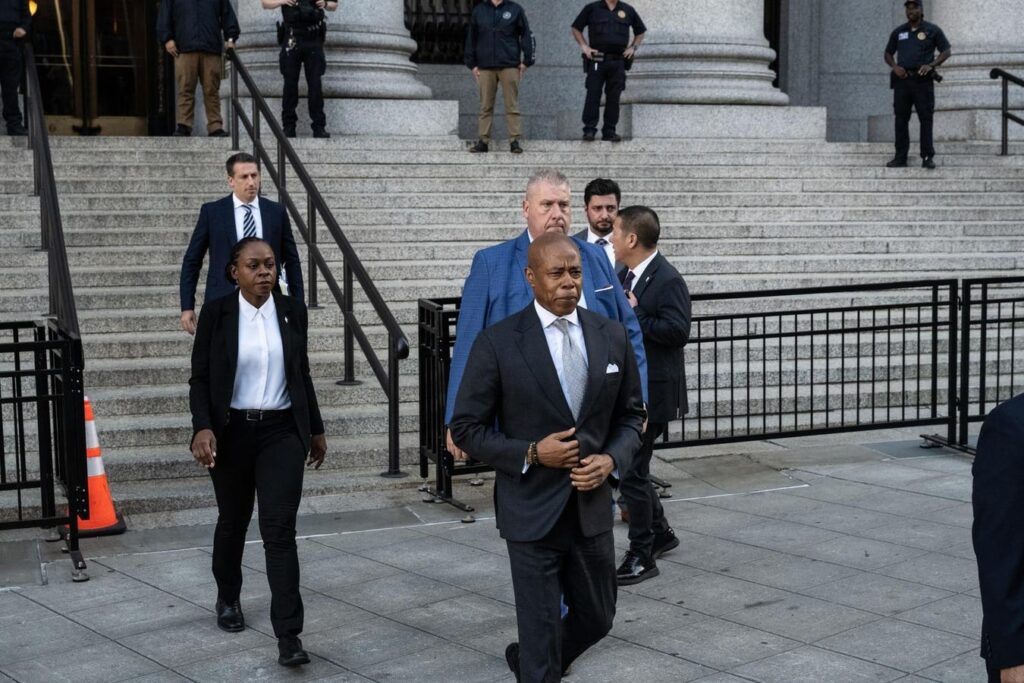NEW YORK, NEW YORK – NOVEMBER 1: New York City Mayor Eric Adams departs the U.S. Federal courthouse … [+]
It wasn’t a big surprise when the Justice Department sent a memo to Danielle R. Sassoon, the interim U.S. Attorney for Manhattan, instructing her to dismiss the bribery and other charges brought against New York City Mayor Eric Adams.
The move had been rumored for quite a while, and most notably, the memorandum states “The Justice Department has reached this conclusion without assessing the strength of the evidence of the legal theories on which the case is based which are issues on which we defer to the U.S. Attorney’s Office at this time.””
The memorandum indicated that this was to allow Adams to focus on crime prevention and immigration. Meanwhile figures highlighted by Adams indicate that street crime is not a serious problem in New York. Any implication that immigration cannot be dealt with in the Adams administration if he was defending himself in court also appears to be unsupported by any evidence.
It will be interesting to see how Sassoon, a conservative Republican and former clerk for the late Supreme Court Justice Antonin Scalia will respond to the memorandum. In a recent opinion piece in the Wall Street Journal, Sassoon strongly criticized the mass commutations of former President Joe Biden. At the close of his term, she wrote, “The mass commutations – made without consulting the career prosecutors who handled the cases or the judges who imposed the original sentences, and apparently without regard to the underlying facts of each case – undermine our mission to keep Americans safe and administer justice fairly.” She went on to say that “The lack of a considered decision-making proess exhibited a disregard for the work and knowledge of prosecutors and judges.” These opinions were reinforced today when Sassoon resigned her position in a brief email.
In fact, the U.S. Attorney does not have the authority to dismiss the charges. A motion by the U.S. Attorney would have to make a motion to Dale E. Ho, the judge assigned to the case, who would have the authority to dismiss the case. Ho already has turned down a motion to dismiss the charges brought by Adams’ lawyers, and he is not likely to turn down a motion to dismiss brought by any U.S. Attorney.
The Trump administration’s actions to dismiss the bribery charges against Adams is not an isolated case. Earlier this month, the president signed an executive order directing the Justice Department to stop prosecutions under the Foreign Corrupt Practices Act which outlaws bribery and corruption in foreign countries. The president’s basis for taking this unusual step was that by not allowing bribery, it put American businesses at a competitive disadvantage, particularly in countries he said where such practices were common.
This law has been used many times in the past, most notably against Goldman Sachs for its role in the looting of Malaysia’s sovereign wealth fund, which resulted in a fine of $2.9 billion.
Last year the Justice Department and the Securities and Exchange Commission, which have joint jurisdiction for enforcing the FCPA, brought 26 enforcement actions with another 31 companies presently under investigation.
It should be noted that the new policy in regard to the FCPA should not be taken by companies as an invitation to use bribery in their foreign business dealings. The statutes of limitations for FCPA violations are five years for its anti-bribery provisions and a future administration may not take the permissive position that the Trump administration has taken. Further, other countries have their own anti-bribery laws such as France’s SapinII Law and the UK Bribery Act. The UK Bribery Act is particularly strict and applies to any company that does business in the UK regardless of where the bribery may have occurred.
Read the full article here
